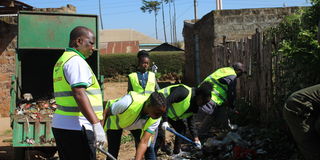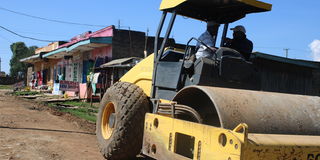Premium
How land grabbing dampened Nyandarua's Kasuku Town

Youth at a clean up exercise in residential areas within Kasuku town in Nyandarua County.
Were it not for extensive land grabbing and poor planning, Kasuku Market could be one of the busiest centers in Nyandarua County.
Despite its location on the Nairobi-Ol Kalou-Nyahururu Highway and ample expansion space, the market’s growth has stagnated for over four decades since its first shop was established in 1984 by a trader, Josiah Gatimu.
Kasuku could have flourished much like neighbouring Mairo-inya town which was awarded a municipality status last year and is now the third major revenue generator for Nyandarua County after Ol Kalou and Engineer towns.
However, issues rooted in land mismanagement, public land encroachment and limited essential amenities have hindered its growth.
Historically, the town’s land was first occupied by a colonial settler nicknamed Kasuku and following Kenya’s independence, it was transferred to the Settlement Trustee under Unit 207 Ol Kalou Salient which designated portions for public amenities such as a five-acre stadium, a four-acre land market space, school and government offices.
But in recent decades these areas have come under private ownership with some public utility lands like roads fenced off or blocked by developments.
One of the pioneer farmers and traders in Kasuku town Simon Ngatia, a 72 years old, attributes these challenges to the defunct Ol Kalou County Council which allowed allocations of public utility lands for private ownership.
“The stadium and market area near the main road were planned for the public but were allocated to private entities. Without this private encroachment, Kasuku could have grown much larger. If the initial plan by the Settlement Trustee adhered to, the town would have been very big, but the private developers and churches form a barrier for the expansion,” says the trader.
He recalls that before independence, the market area had some colonial buildings, but was at that time known as the Mugaa area under the Commissioner of Lands.

Nyandarua County government road construction equipment rehabilitating part of the access roads in Kasuku Town, Nyandarua County.
Plot ownership in the market began through balloting in 1984 at a price of Sh 10,000, yet plots are now valued up to between Sh800,000 and Sh 1 million.
In nearby Ol Kalou town, a similar plot fetches between Sh 2 million and Sh 3 million depending on the location.
Kasuku’s affordability makes it attractive to investors but limited access roads, poor waste management, and a lack of essential services dampen its appeal.
For instance, the market lacks a cemetery, waste disposal site, and space for Kenya Cereals and Produce Board (KCPB) storage facilities. While the area technically covers over 200 hectares, only about 10 hectares are actively developed.
Currently, the developed part of the town occupies less than 10 hectares with only three rural Saccos Viktas, Vision and Nyala Saccos with no mainstream bank.
Mr Ngatia said Kasuku has the potential to be a big revenue generator for the county government but points to the urgent need for better planning and the reclamation of public lands.
“Investors are frustrated by the lack of access roads.The private ownership of subdivided plots within Kasuku limits development and blocks key access routes, creating barriers for expansion,” he explained.
Environmental conservation is another key challenge in Kasuku.
Cleanup initiatives
Copicad (Community Organisation for Positive Impact, Care, and Development), a local organisation, regularly organises cleanup initiatives to address the issue.
CEO Thomas Ndiritu notes that the lobby has taken on weekly garbage collection, particularly in residential areas without proper waste disposal systems.
However, road encroachments complicate waste collection.
“Blocked drainage systems from waste accumulation are a severe health risk. Environmental conservation must start at home and Kasuku is plagued with environmental pollution due to improper waste management,” he said in an interview with Nation. Africa.
Nyandarua Governor Kiarie Badilisha acknowledges that public utility land grabbing and access road encroachment are issues affecting urban centers county-wide.
According to Governor Badilisha, the legal status of many privately held plots complicates efforts to reclaim them. However, the county is actively working to restore the town’s access roads, enhance waste management, and improve local infrastructure for a healthier environment.
“We working on how to reclaim the lands, but the most unfortunate thing is that the holders have land documents. But this menace cannot be allowed to continue, our people must live in a healthy environment.
We are currently repairing the access roads as part of making the town clean and easy for garbage collection tracks.
“I also understand the town relies on water boreholes from neighboring learning institutions, but Kasuku is among the identified areas to benefit from water connection from the Sh20 million E-Jacob dam water project. This water project is designed to provide both domestic and irrigation water,” said the governor.
Faith Wambui, a trader in Kasuku, welcomes the initiatives but stresses the importance of educating the community on environmental conservation.
“In addition to cleanup programs, the county should focus on educating us about waste disposal and enforcing health standards in residential areas to reduce pollution,” Ms Wambui said.





